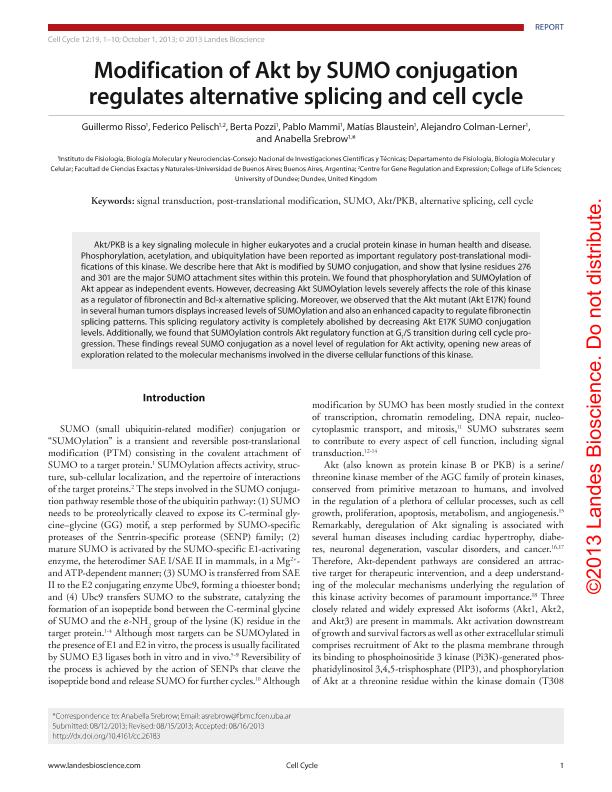Artículo
Modification of Akt by SUMO conjugation regulates alternative splicing and cell cycle
Risso, Guillermo ; Pelisch, Federico Gaston
; Pelisch, Federico Gaston ; Pozzi, María Berta
; Pozzi, María Berta ; Mammi, Pablo Andrés
; Mammi, Pablo Andrés ; Blaustein Kappelmacher, Matias
; Blaustein Kappelmacher, Matias ; Colman Lerner, Alejandro Ariel
; Colman Lerner, Alejandro Ariel ; Srebrow, Anabella
; Srebrow, Anabella
 ; Pelisch, Federico Gaston
; Pelisch, Federico Gaston ; Pozzi, María Berta
; Pozzi, María Berta ; Mammi, Pablo Andrés
; Mammi, Pablo Andrés ; Blaustein Kappelmacher, Matias
; Blaustein Kappelmacher, Matias ; Colman Lerner, Alejandro Ariel
; Colman Lerner, Alejandro Ariel ; Srebrow, Anabella
; Srebrow, Anabella
Fecha de publicación:
08/2013
Editorial:
Landes Bioscience
Revista:
Cell Cycle
ISSN:
1538-4101
Idioma:
Inglés
Tipo de recurso:
Artículo publicado
Clasificación temática:
Resumen
Akt/PKB is a key signaling molecule in higher eukaryotes and a crucial protein kinase in human health and disease. Phosphorylation, acetylation, and ubiquitylation have been reported as important regulatory post-translational modifications of this kinase. We describe here that Akt is modified by SUMO conjugation, and show that lysine residues 276 and 301 are the major SUMO attachment sites within this protein. We found that phosphorylation and SUMOylation of Akt appear as independent events. However, decreasing Akt SUMOylation levels severely affects the role of this kinase as a regulator of fibronectin and Bcl-x alternative splicing. Moreover, we observed that the Akt mutant (Akt E17K) found in several human tumors displays increased levels of SUMOylation and also an enhanced capacity to regulate fibronectin splicing patterns. This splicing regulatory activity is completely abolished by decreasing Akt E17K SUMO conjugation levels. Additionally, we found that SUMOylation controls Akt regulatory function at G₁/S transition during cell cycle progression. These findings reveal SUMO conjugation as a novel level of regulation for Akt activity, opening new areas of exploration related to the molecular mechanisms involved in the diverse cellular functions of this kinase.
Archivos asociados
Licencia
Identificadores
Colecciones
Articulos(IFIBYNE)
Articulos de INST.DE FISIOL., BIOL.MOLECULAR Y NEUROCIENCIAS
Articulos de INST.DE FISIOL., BIOL.MOLECULAR Y NEUROCIENCIAS
Citación
Risso, Guillermo; Pelisch, Federico Gaston; Pozzi, María Berta; Mammi, Pablo Andrés; Blaustein Kappelmacher, Matias; et al.; Modification of Akt by SUMO conjugation regulates alternative splicing and cell cycle; Landes Bioscience; Cell Cycle; 12; 19; 8-2013; 3354-3363
Compartir
Altmétricas



